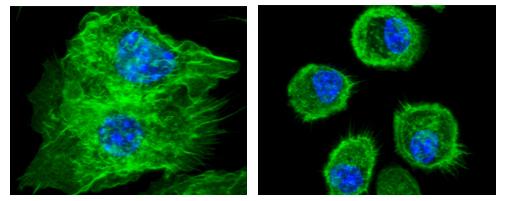Immunoparasitology Unit
Dragana Lj. Jankovic, Ph.D.
Senior Associate Scientist, Immunoparasitology Unit

Major Areas of Research
- Parasite-induced CD4+ Th lymphocyte effector polarization
- Regulatory mechanisms that control immunopathology during parasitic infections
- Hematopoiesis and lymphocyte homeostasis in steady-state and infection
- Molecular pathways involved in recognition of toxoplasma by human primary myeloid cells
Program Description
Parasitic diseases provide unique in vivo models for studying immune responses due to the biological diversity of the pathogens involved and their ability to evade host defense mechanisms in order to establish persistent infections. The observation that the immune system is able to “tailor” host-protective responses to a specific type of parasite (e.g. protozoan vs. heminth) played a major role in the discovery of the functional diversity of CD+ T helper (Th) lymphocyte effector subsets defined by specific cytokine secretion profiles. Our studies of parasitic infections have provided important insights into the mechanisms underlying CD4+ T cell polarization and how microbial components condition dendritic cells to promote differentiation of specific type of Th effectors. Moreover, our work on the analysis of Th subsets during parasitic infection has led to the discovery that effector cells can themselves be induced to display immuno-regulatory activity.
The overall objective of our work is to better understand the immunology of host-pathogen interaction and basic aspects of CD4+ T cell effector and regulatory function. Our major research projects are (1) studies on the differentiation of Th1/Th2 effector choice in murine models of infection with two human parasites, the intracellular protozoan Toxoplasma gondii and the helminth Schistosoma mansoni, (2) the study of regulatory circuits that control Th lymphocyte responses in the same models, (3) the regulation of hematopoiesis and lymphopoiesis in steady-state vs. parasite-induced inflammatory conditions, and (4) elucidation of molecular pathways triggered by phagocytosis of live toxoplasma that are required for cytokine production by human primary myeloid cells. We believe that understanding the mechanisms that govern the induction of host resistance versus immunopathology is critical for successful immune intervention and rational design of more effective vaccines and immunotherapies for infectious diseases.

Dendritic cells conditioned to promote Th1 or Th2 polarization with LPS (left) or schistosome egg extract (right) were stained with phalloidin (green) and DAPI (blue) and analyzed by confocal microscopy.
Biography
Dragana Lj. Jankovic, Ph.D., is a Senior Associate Scientist in the Immunoparasitology Unit. The overall objective of our work is to better understand the immunology of host-pathogen interaction and basic aspects of CD4+ T cell effector and regulatory function.
Selected Publications
Iwamura C, Bouladoux N, Belkaid Y, Sher A, Jankovic D. Sensing of the microbiota by Nod1 in mesenchymal stromal cells regulates murine hematopoiesis. Blood. 2017 Jan;129(2):171-176.
Kugler D, Flomerfelt FA, Costa DL, Laky K, Kamenyeva O, Mittelstadt PR, Gress RE, Rosshart SP, Rehermann B, Ashwell JD, Sher A, Jankovic D. Systemic toxoplasma infection triggers a long-term defect in the generation and function of naive T lymphocytes. J. Exp. Med. 2016 Dec 12;213(13):3041-3056.
Tosh KW, Mittereder l, Bonne-Annee S, Hieny S, Nutman TB, Singer SM, Sher A, Jankovic D. The IL-12 response of primary human DC and monocytes to Toxoplasma gondii is stimulated by phagocytosis of live parasites rather than host cell invasion. J. Immunol. 2016 Jan 1;196(1):345-356.
Kugler DG, Mittlestadt PR, Ashwell JD, Sher A, Jankovic D. CD4+ T cells are both a trigger and target of the glucocorticoid response that prevents lethal immunopathology in toxoplasma infection. J Exp Med. 2013 Sep 23;210(10)1919-1927.
Steinfelder S, Andersen JF, Cannons JL, Feng CG, Joshi M, Dwyer D, Caspar P, Schwartzberg PL, Sher A, Jankovic D. The major component in schistosome eggs responsible for conditioning dendritic cells for Th2 polarization is a T2 ribonuclease (omega-1). J Exp Med. 2009 Aug 3;206(8):681-1690.
Research Group
Parasitic diseases provide unique in vivo models for studying immune responses due to the biological diversity of the pathogens & their ability to evade host defense mechanisms to establish persistent infections. Our goal is to better understand the immunology of host-pathogen interaction & basic aspects of CD4+ T cell effector & regulatory function.

